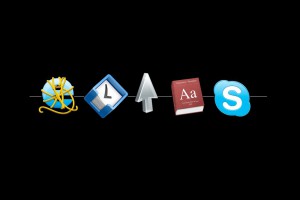“The most valuable sort of press is not articles about you, it’s when people mention you in passing as a matter of course.”
– Paul Graham, cofounder Viaweb
We Grow Beautiful Websites
“The most valuable sort of press is not articles about you, it’s when people mention you in passing as a matter of course.”
– Paul Graham, cofounder Viaweb
Alltop’s ecommerce category now features our blog here at Elias Interactive. We are now proudly sporting our new alltop badge (to the right of this post under categories). Thanks @NEENZ for taking care of us!
People who saw [VisiCalc] , who needed it, got it. Sorry, no – some of the people who needed it got it. You have to be a person who is able to look at a general-purpose tool and be able to think, “How would I use that to solve my problem?” Most people are not that way. They look for a tool that is being used already for something close to their problem and then understand what it is. Many people who saw the spreadsheet with an example, if the example wasn’t in their field, they couldn’t make the leap. Because they’re not programmers in their mind.
But, if you showed it to somebody where it clicked, either because they understood the general-purpose nature and could apply it to their own needs or you showed them an example, like financing forecasting or something that they did, and they knew the other tools in the world, they got very excited. If you showed it to a computer person who didn’t have those needs, they’d say, “That’s kind of cool, but what’s so special about that? I could just do it in Basic.” Now, there were those that hadn’t seen as interactive a computer before, weren’t as aware of word processing and some of the other things, and, when they saw it, it really opened up their minds to what you could do interactively with computers. Jean-Louis Gassee, who went to Apple, is one of the people who says that.
There those people – not that many, but enough that it got a lot of people going in computer software. And then were people – the general public- who thought computers could do everything, and they weren’t at all surprised. They’d saw, “Well, of course, computers can do so much more than that. What’s special?” Lucky for us, the people who funded things – the MBA types got it, the investment banker types got it, because this was something they would need. And that made them get the personal computer.
– Dan Bricklin, Cofounder Software Arts
I’ve noticed a number of friends who aspire to build software products fall prey to the notion that what they create is “kind of cool, but not exactly special.” “After all,” they think, “someone with reasonable software ability could build the same thing.” Maybe they go talk to some non-tech friends who want to encourage them but secretly assume that computers can do it already and thus just aren’t surprised.
What if startups spent more time trying to understand business problems so that they can apply their product to more needs? Stop expecting customer to connect all of the dots. Do it for them – not because they are stupid but because they are too busy to study your features to uncover how they could use your stuff.
Guy Kawasaki tweeted a link earlier today that featured some creative uses of Mac icons. Follow the link and you’ll see several words spelled out with an assortment of icons. When Luke saw the link, he couldn’t resist creating one for Elias.

First of all, try to have the highest of ethics and to be open and truthful about things, not hiding. If you have to hide something for company reasons, at least explain what you’re doing. Don’t mislead people. Know in your heart that you are a good person with good goals because that will carry over to your own self-confidence and your belief in your engineering abilities. Always seek excellence: make your product better than the average person would.
If you can just quickly whip something out and it’s done, maybe it’s time, once in a while, to think and think and think, “Can I make it better than it is, a little superior?” What it does is not necessarily make the product better in the end, but it brings you closer to the product and your own head understands it better. Your neurons have gone through the code you wrote, or the circuits you designed, have gone through it more times, and it’s just a little more solidly in your head, and once in a while you’ll wake up and say, “…I just realized a bug that’s in there, something I hadn’t thought of.”
Or, if you have to modify something, or add something new, you can do it very quickly when it’s all in your head. You don’t have to pull out the listing and find out where and maybe make a mistake. You don’t make as many mistakes. Just believe that what you have it better than whatever has existed before. We should only move forward in technology and not backwards.
Lack of tools: find a way to do it. If you say, “I have to have a tool, ” and you are a prima donna – “I have to have a certain development system” – if you can’t fitter out a way to test something and get it working, I don’t think you’re the right type of person to be an entrepreneur. Entrepreneurs have to keep adjusting to … everything’s changing, everything’s dynamic, and you get this idea and you get another idea and this doesn’t work out and you have to replace it worth something else. Time is always critical because somebody might beat you to the punch.
– Steve Wozniak, cofounder Apple Computer (taken from Founders at Work)